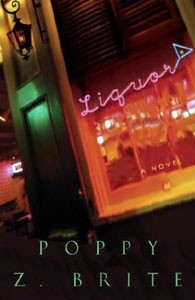 Liquor
Liquor
by Poppy Z. Brite
Three Rivers Press. 352 pages, $13.95 (paper)
NEW ORLEANS, described in the cover synopsis as “America’s most sublimely ridiculous city,” is perhaps also America’s most often misrepresented, at least where literature is concerned. There’s much more to the city than Mardi Gras, the French Quarter, sexually omnivorous vampires, Cajun accents, and ultraviolet prose. In Liquor, Poppy Z. Brite has set out to chronicle the lives of some New Orleans residents in a more realistic way than most other writers, including Brite herself, have done in the past.
Brite established herself as a writer of considerable talent ten years ago with a pair of lush and gruesome horror novels, Lost Souls and Drawing Blood. She has long been typecast as a horror author with a penchant for vampires, gay men, serial killers, and things that go slurp in the night. Liquor may come as a surprise to anyone expecting more lavish gore in the Quarter, because this time Brite, whose husband is a chef, has written a satire about the restaurant world of her native city.
John Rickey and Gary “G-Man” Stubbs are a gay couple in their late twenties. They grew up together in the Lower Ninth Ward, a working-class district far removed from the parts of the city most readers know best. In Liquor’s limited-release prequel, The Value of X (Subterranean Press, 2003), Brite told the story of Rickey and G-man’s coming-of-age and coming-out experiences, as well as the beginning of their overlapping culinary careers. This time around (she actually wrote Liquor first), Rickey has an idea for a restaurant of their own, in which every item on menu will include liquor as an ingredient. It’s a perfect fit for the most booze-soaked city on earth, and before long Rickey and G-man have the backing of a wealthy but slightly unhinged restaurateur. Liquor is essentially the story of how Rickey and G-man get their eponymous restaurant off the ground, and what happens next. Among other things, we learn that the restaurant world can be a cutthroat place, the two men have made enemies, and there are people willing to take their grudges to fatal extremes.
This book is a success on several levels. Perhaps most significantly, Brite has matured as a writer. She began publishing in her late teens and has had a rather controversial career, culminating in the release of the serial-killer love feast Exquisite Corpse in 1996. Her hallmark lush prose and sometimes overwhelmingly horrific imagery have given way here to a leaner and more realistic approach, yet she also doesn’t shortchange the reader on description and setting. You’re there, but you’re not drowning in imagery and adjectives. The language serves the story instead of calling attention to itself.
Characterization has always been one of Brite’s strengths, but she writes about Rickey and G-man as if she’s known them all her life. As in the John Kennedy Toole classic A Confederacy of Dunces, Brite populates her book with the sort of larger-than-life characters that one regularly encounters in New Orleans. Both writers share a talent for making outlandish people seem to be just plain folks. Although Liquor might be intended as an homage, it’s a better book. Toole’s protagonist, Ignatius Reilly, is one of the greatest comic oafs in literature, but Brite’s characters are the sort you’d actually want to have a drink with, not run from.
Brite also makes the restaurant scene intriguing and accessible. Most readers are unlikely to have considered what happens between placing an order and the arrival of the food, but the people in the kitchens are a fascinating motley crew, rock stars on their own little stages. It’s compelling reading, seasoned with a dash of mordant wit.
Perhaps some of the minor characters can be hard to keep track of. Perhaps the reader unfamiliar with the history and layout of New Orleans will be a bit lost at times. Perhaps the restaurant jargon will require a dictionary. Other than that, it’s damn hard to find fault with Liquor. There’s nothing quite like a novel written by an author who’s creatively at the top of her game, having fun with characters and a city she loves, and writing about a subject she knows well. Liquor is that kind of book.
________________________________________________________
Marshall Moore is the author of The Concrete Sky (2003) and the forthcoming Black Shapes in a Darkened Room.





